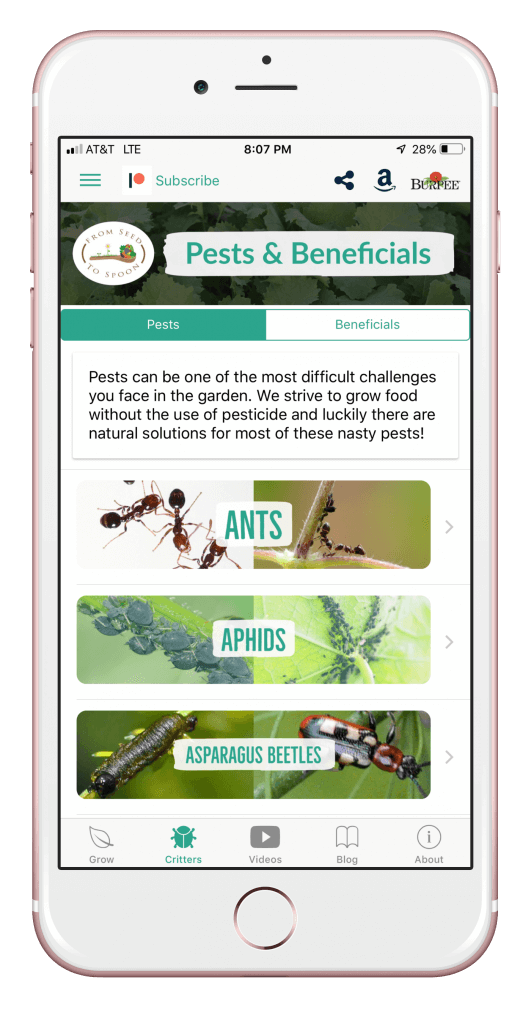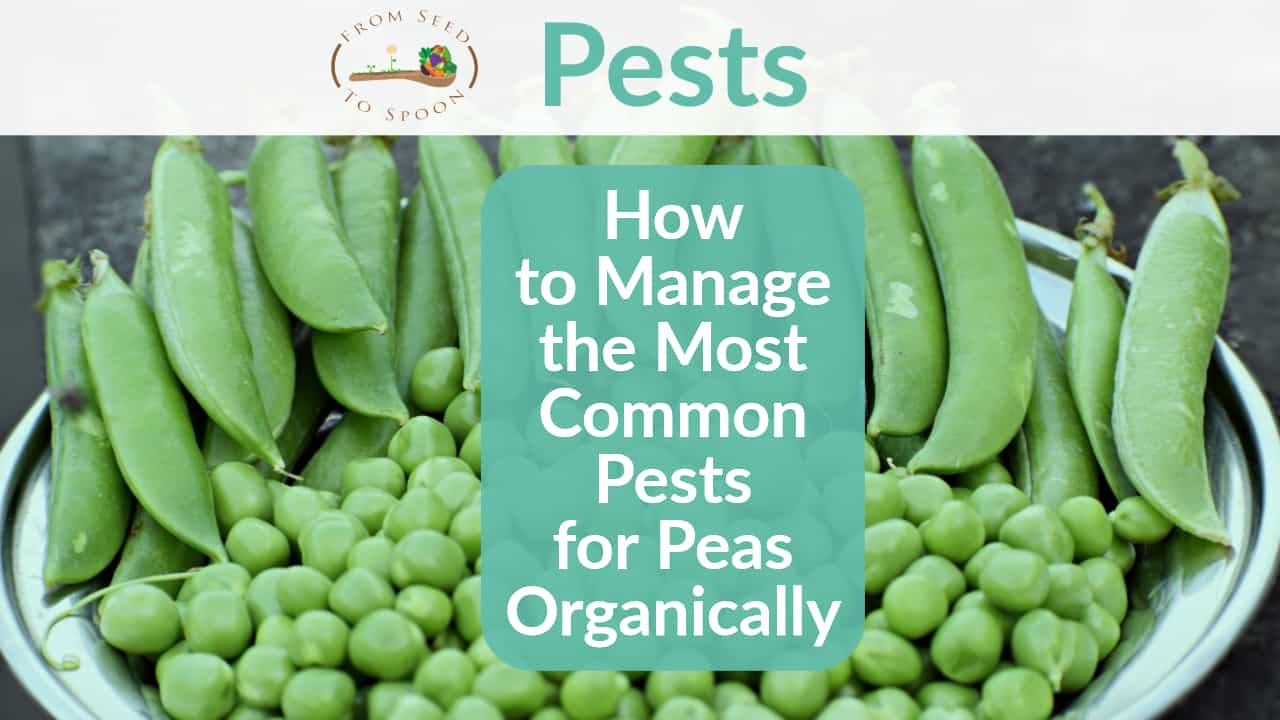You won’t be able to truly appreciate peas until you’ve had fresh Sugar Snap peas from the vine. These peas are extremely prolific and typically give us more than we can handle in a season. Because of the versatility of peas in cooking, everyone should be able to find a way to enjoy this vegetable! Peas can be attacked by a variety of different pests, but can be managed easily with organic methods.

Treatment Options:
- Hand-pick (or pay your kids a quarter each to handpick for you like we do!)
- Cover the plants with insect netting (floating row covers) from when they are babies. This will help to prevent them from becoming an issue!
- Use the organic pesticide, BTK (bacillus thuringiensis Kurstaki). BTK is a naturally occuring microorganism that sickens and kills caterpillars without harming butterflies, bees, and other beneficial insects. There are varied opinions regarding the safety of BTK, but it’s classified as an organic treatment and is certainly safer than using a more toxic pesticide.

Treatment Options:
- Use the organic pesticide, BTK (bacillus thuringiensis Kurstaki). BTK is a naturally occurring microorganism that sickens and kills caterpillars without harming butterflies, bees, and other beneficial insects. There are varied opinions regarding the safety of BTK, but it’s classified as an organic treatment and is certainly safer than using a more toxic pesticide.
- Beneficial insects such as trichogramma wasps, lady bugs, and lacewings can help to fight against the corn borer eggs.

Cucumber beetles look similar to ladybugs. They can either be spotted or striped with yellow and black coloring. The adults feed on stems, foliage, and flowers. The larvae weaken the plant by feeding on the roots. They also spread bacterial wilt and squash mosaic virus. Cucumber beetles can be extremely difficult to control. Make sure to stay on top of them before they get too bad!
Treatment Options:
- A good prevention is to cover the plants with insect netting (floating row covers) from when they are babies. This will help to prevent them from becoming an issue!
- Using a yellow sticky trap can help to attract and trap cucumber beetles.
- We build DIY cucumber beetle traps using yellow cups, sticky glue, and clove essential oil. See our video for more details!

Treatment Options:
- Cover the plants with insect netting (floating row covers) from when they are babies. This will help to prevent them from becoming an issue!
- Cardboard “collars” can be made from toilet rolls or paper towel rolls and placed around each seedling to keep these cutworms out. You can also place toothpicks around seedlings so the worm cannot wrap around the stem.
- Diatomaceous earth can also be laid down around your seedlings to help get rid of them.
- Sprinkling coffee grounds or crumbled egg shells can help repel them from your seedlings as well.

Treatment Options:
- Cats & dogs are effective hunters of gophers, mice, and other small rodents!
- Flooding the tunnels with water can be effective.
- The gopher hawk is a reusable trap that’s very effective and doesn’t use any chemicals or poisons!
- The Victor Black Box is a reusable trap that’s very effective and doesn’t use any chemicals or poisons!
- You can cover the bottom of your raised bed with hardware mesh to help keep gophers from tunneling into them.
- Solar-powered sonic repellers can also be effective. They create an uncomfortable environment for the gopher by emitting vibrations and sounds into the ground periodically.

Treatment Options:
- Hand-picking and placing the beetle in a soapy water bucket is a great way to get rid of them.
- Companion planting potatoes can help prevent Mexican bean beetles.
- Placing insect netting (floating row covers) over your plants is a great way to prevent insect issues.
- Beneficial insects such as green lacewings, ladybugs, and praying mantis can be helpful to fight these beetle’s eggs and larvae.
- Yellow sticky traps have also been shown to be effective at catching these pests.
- Applying beneficial nematodes and neem oil can also be effective. Make sure not to apply the neem oil when the temperature is above 90, or else you could suffocate your plant!

Treatment Options:
- Placing an automated sprinkler to scare the rabbit away is helpful.
- Rabbits are scared of larger predators. Applying blood meal around the perimeter of your garden has been shown to deter rabbits. Rabbit repellent, fox urine granules, or even human hair and urine can help to deter them as well.
- You can also use a live animal cage trap to catch them.

Treatment Options:
- Placing a motion-activated sprinkler near where the problem area is will help to scare the raccoons away.
- Raccoons are scared of larger predators. Applying blood meal around the perimeter of your garden has been shown to deter small mammals. Raccoon repellent, fox urine granules, or even human hair and urine can help to deter them as well.
- Raccoons can be scared of noises as well. You can leave a radio close to the problem area to try and scare them away.
- They can also be deterred by a mixture of garlic and chili powder sprinkled around the problem areas.
- You can also set up a small animal cage trap to catch the raccoon if all else fails!

Treatment Options:
- Creating a “collar” for the plant made from a toilet roll or paper towel roll can be beneficial as well to help keep the fly away from the base of the plant.
- Sprinkle diatomaceous earth over areas you want to protect. Be careful though: DE can harm beneficial insects as well if they come in contact with it.
- Cover the plants with insect netting (floating row covers) from when they are babies. This will help to prevent them from becoming an issue!
- Yellow sticky traps can also work to catch these flies so they cannot lay their eggs to become maggots.
Learn more about growing over 100 different foods, including how to manage various pests in our FREE iOS, Android, or Universal Web App!



Carrie Spoonemore, co-founder of “From Seed to Spoon,” stands as a beacon of inspiration for gardeners and health enthusiasts alike. Her journey alongside her husband, Dale Spoonemore, in creating a platform that demystifies gardening and promotes a healthier lifestyle, has made a significant impact on individuals around the globe. Through the “From Seed to Spoon” app, Carrie has dedicated herself to empowering people to take control of their health and environment by growing their own food.
With a profound belief in the power of gardening to improve mental and physical health, Carrie’s contributions to the Seed to Spoon blog reflect her holistic approach to wellness. Her articles often focus on the nutritional benefits of homegrown fruits and vegetables, organic gardening practices, and the mental health benefits of spending time in nature. Carrie’s expertise in health science shines through in her detailed discussions on how specific plants can contribute to a balanced diet and overall well-being.
Carrie’s passion for gardening is deeply intertwined with her commitment to family and community wellness. She frequently shares personal stories of how gardening has brought her family closer together, offering practical tips for involving children in gardening activities and making it a fun, educational experience. Her writing encourages families to explore gardening as a means of spending quality time together while learning about nature and sustainability.
In addition to gardening advice, Carrie’s contributions to the blog include insights into the use of technology to enhance the gardening experience. She has played a crucial role in designing the “From Seed to Spoon” app to be user-friendly, ensuring that users of all ages and backgrounds can navigate the complexities of gardening with ease. Her vision for the app is not just as a gardening tool but as a vehicle for change, inspiring individuals to adopt a more sustainable lifestyle by growing their own food.
Carrie Spoonemore’s presence on the blog is marked by her compassionate approach to teaching and her unwavering belief in the transformative power of gardening. Her work continues to inspire a community of gardeners to pursue a healthier, more sustainable way of living, proving that with the right tools and knowledge, anyone can become a gardener and advocate for their health and the planet.







One thought on “How to Manage the Most Common Pests for Peas Organically in Your Backyard Vegetable Garden”
Hey, I just wrote about gophers! They are just a nuisance in lawns for us though. Not quite the same.